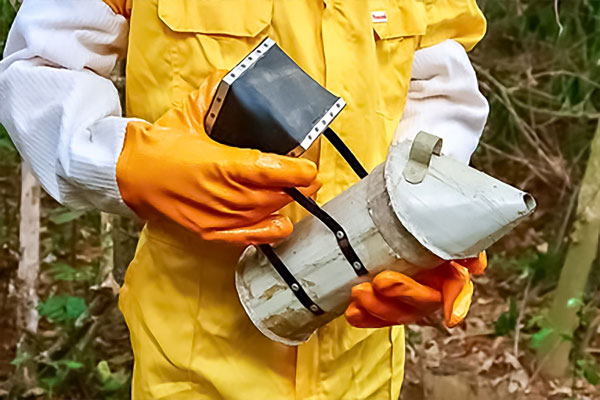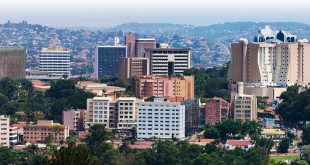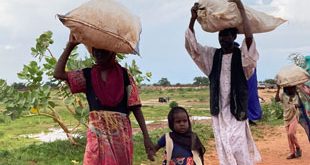
Young entrepreneurs like beekeeper Blessing Hallie are finding a future in green jobs.
SPECIAL REPORT | BIRD AGENCY | Along a rocky dirt road in Lofa County, Liberia, past a field of pineapples, through a forest of rubber trees and up a winding path, sits a wooden beehive, humming quietly in a thicket. The bee box is rectangular, about three feet long, with a corrugated roof.
The hive’s bees can be seen squishing in and out of three small holes in the structure. A few circle the box. Beekeeper Blessing Hallie, who has come to check on the hive’s activity, is unmoved as the buzz intensifies.
“I was scared the first time I worked with the bees because I thought when you went around them, they would sting you. But getting to know them, bees are our friends,” she said, smiling for a photo.
“Bees teach us many things. They teach every human being to be productive. To do something for yourself.”
That’s a lesson that the young beekeeper seems to have taken to heart. Hallie hopes to use her harvest profits to pay her way to becoming an eye doctor. Having dropped out of school after grade 11, her beekeeping income has already helped her finish school. Now, waiting for her results, she hopes to use her income from her honey business to study further.
Hallie and her family are returnees to the area, which was hit hard by Liberia’s two civil wars, the first from 1989-1996 and the second from 1999-2003. A highly fertile area, farming now provides incomes to many residents in the area, ensuring a ready market for the honey and also plenty of pollen for the bees, which farmers in turn need to pollinate their crops.
“To work with bees is very important, I will tell you this. The honey from bees can be used for medicine and food. Even the waste product from bees is medicine. The beeswax can be reused in the bee box to attract more bees to come into the box… So, it’s not just important for the honey but to produce other things we need,” the beekeeper explained.
While studying is important to her, Hallie now has the potential to grow her small business and help others in the area become beekeepers too, by sharing her knowledge of beekeeping and the building of hives.
“If you make your farm, the bees will come,” she explained.
Hallie’s success is important to Youth Advance, the organisation that assisted Hallie and which offers opportunities for youths in the area who, like Hallie, had to leave school early.
The organisation provides training, starting with basic literacy and numeracy skills. It then
teaches youths life skills, like how to find a job – and how to keep it. Participants are encouraged to start their own small businesses or to learn a skill from businesses in the community. Recently, the project has prioritised helping youths land “blue” or “green” jobs – jobs that mitigate or respond to climate change.
In the area where Hallie operates her beekeeping business, annual rainfall has decreased on
average and rain patterns have become less predictable and more intense. Crops yields are
decreasing too, a particularly worrisome trend for the 70% of Liberians who rely on agriculture
for their livelihoods, according to Liberia’s Environmental Protection Agency.
While the challenges are many, there are also opportunities for young Liberians to adapt and innovate, as shown by Hallie. Successes like hers are crucially important to Youth Advance, which is funded by USAID and implemented by the Education Development Center (EDC).
Example like Hallie are also important to a continent that is quickly recognising that investment in young people – especially those most impacted by climate change – needs to be prioritised.
While Hallie has seen honey become a lucrative product in Lofa County, with the market for honey growing rapidly in the last two years alone, the boom has also led to a growth in informal honey harvesting. Informal harvesters regularly use burning sticks inserted into a tree to recover honey, killing many bees, or even destroying the hive and damaging the tree.
Hallie explained that wild honey was easy to spot in the market.
“The real honey looks perfectly clean,” she explained, “but when you harvest with ash, it looks a little bit black. The best way to harvest bees and have bees grow is to make your farm. No need to go into a tree with ash.”
According to Hallie, a gallon of honey – roughly the amount of honey from the harvest one of her three bee boxes – can sell for the equivalent of nearly US$30. That represents significant savings towards her future university fees.
Programs like Youth Advance are equipping young people – especially those most affected by climate change – to contribute to a growing green and blue economy that will require their talents, perspectives and assets. But additional investments are needed. Whether through established green businesses or starting a new one, young people – part of the biggest generation ever – are the future of the green economy.
In the meantime, Hallie and others are widening the expectations of what youths – and particularly women – are capable of.
“There are many things here that men do that women don’t do,” Hallie said.
“Men are the ones who harvest honey. Now, people are getting to know that women can do what men can do. I have younger sisters and a niece, and they see what I’m doing, and they’re impressed. They want to be like me.”
******
SOURCE: Caitlin Flynn, bird story agency
 The Independent Uganda: You get the Truth we Pay the Price
The Independent Uganda: You get the Truth we Pay the Price


